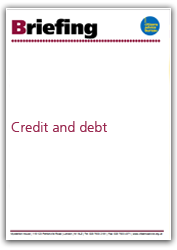A life in debt

The profile of CAB debt clients in 2008
Key findings:
In July 2008, 52 Citizens Advice Bureaux in England and Wales surveyed 1,407 new debt clients. We found that:
- On average CAB debt clients owed £16,971 in 2008, two thirds higher than in 2001.
- More than half of the clients in 2008 had four or more priority debts, such as mortgage or rent arrears, fuel bills or council tax arrears.
- One client in ten had ten credit debts or more.
- Forty five per cent of the homeowners had mortgage or secured loans arrears in 2008, up from 30 per cent in 2004.
- Thirty per cent of the homeowners spent half or more of their monthly income on housing costs.
- Two thirds of the homeowners with mortgage or secured loans arrears were in priority need for rehousing.
- Forty three per cent of the CAB debt clients in 2008 were in fuel poverty because they spent more than 10 per cent of their income on fuel.
- Half of CAB debt clients were in water poverty because they spent more than three per cent of their income on water.
- More than half of the clients (58 per cent) had no spare money to pay their credit debts.
- Clients who had spare money to pay their debts would take on average 93 years to repay them in full.
- Nearly a third of CAB clients could be eligible for the debt relief order (DRO) a new alternative to bankruptcy which comes into force in April 2009.
Introduction
Citizens Advice have seen a dramatic 100 per cent increase in the number of debt enquiries they have dealt with over the last 10 years. Debt is now the number one advice issue in bureaux, accounting for one in three of all enquiries. CAB advisers around the country are dealing with over 6,923 new debt problems every working day. Here are a few examples:
A lone parent with three children sought advice from a CAB in West Yorkshire. She was suffering from serious depression and had attempted suicide several times following domestic violence and a relationship breakdown. She had a number of debts, including a £706 fuel bill which was being collected at £10 per week via her pre-payment meter. The client could not afford her basic living expenses and was falling into debt with other priority bills. At the time of seeking advice, she relied on her local church delivering food parcels and could not afford to meet her health costs.
A Greater Manchester CAB helped a woman who was unable to work following an accident and was now living on benefits. She needed advice about her debts. The client told the CAB that she could not afford to put the heating on this winter and was terrified of getting further into debt. She had borrowed a ski suit from a friend to wear to keep her warm in her house.
A man sought advice from a CAB in North East Wales about £60,000 of credit debts and mortgage arrears. His home was being repossessed. He had decided that the best way forward to clear his debts was to go bankrupt but could not afford the court fees to petition for bankruptcy (£495).
It has been four years since we last undertook a survey of CAB debt clients. The statistics from the 2004 survey proved extremely valuable by giving us a clear snapshot of CAB debt clients. We wanted to see whether this profile of CAB debt clients had changed in 2008 in different economic conditions.

